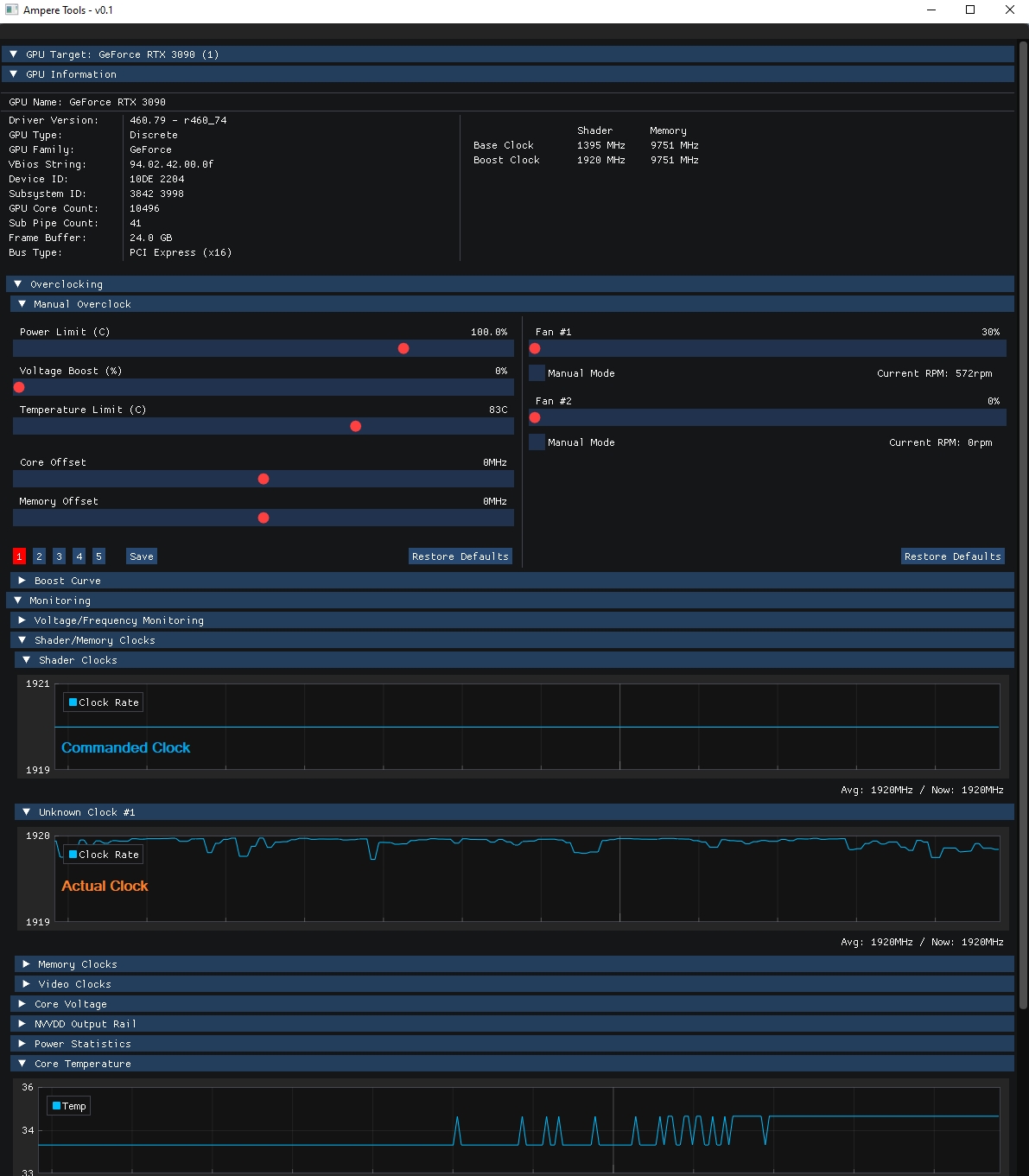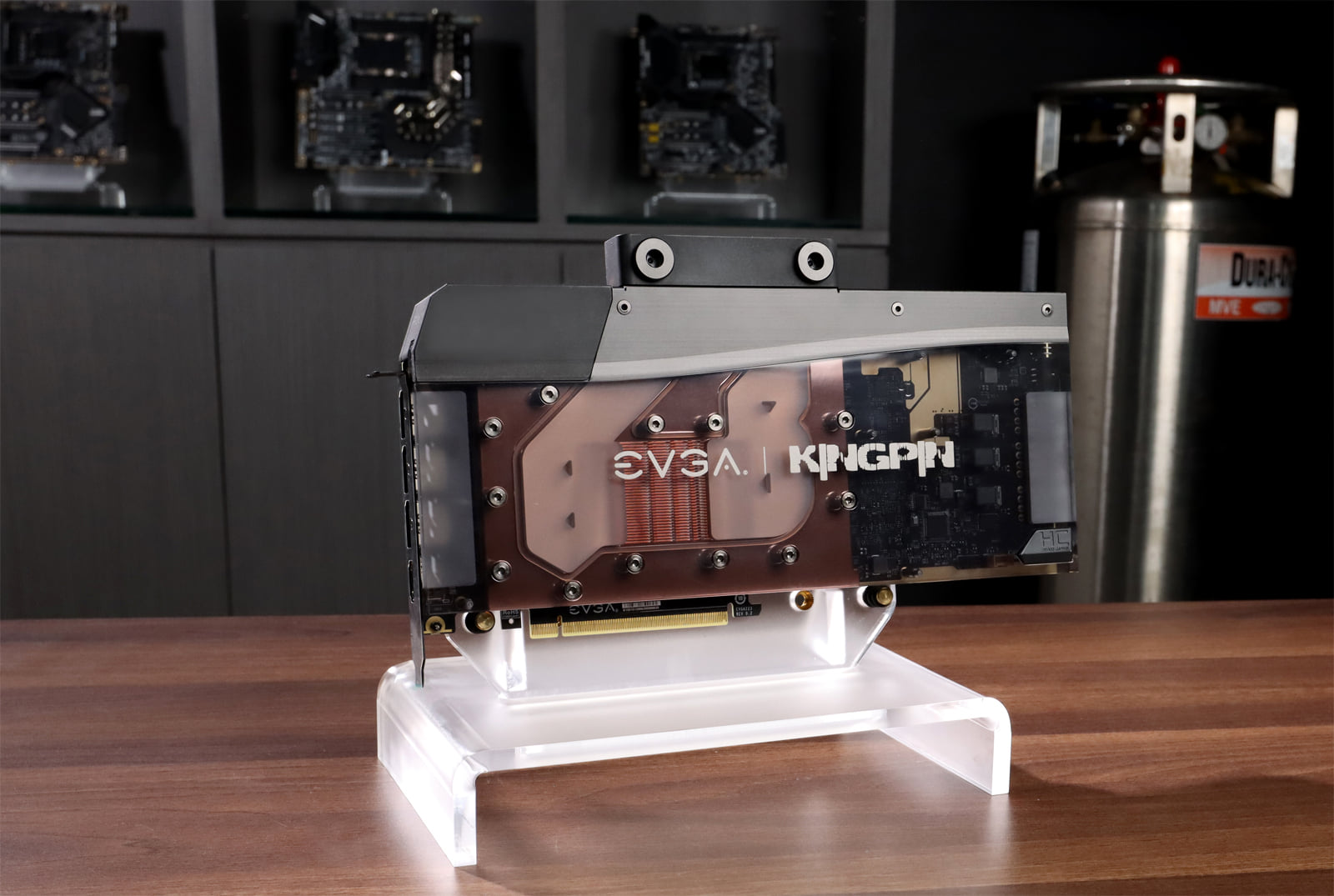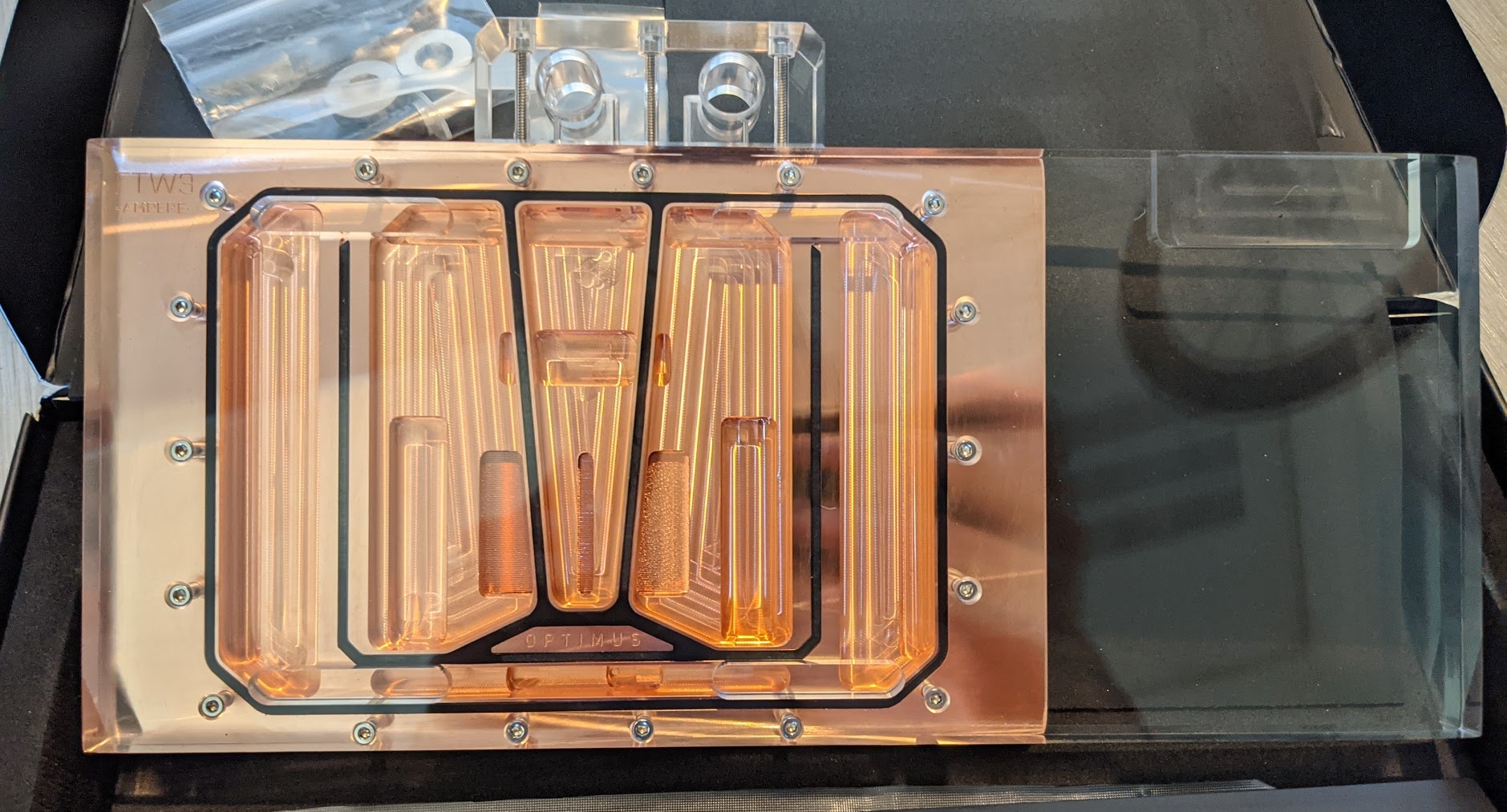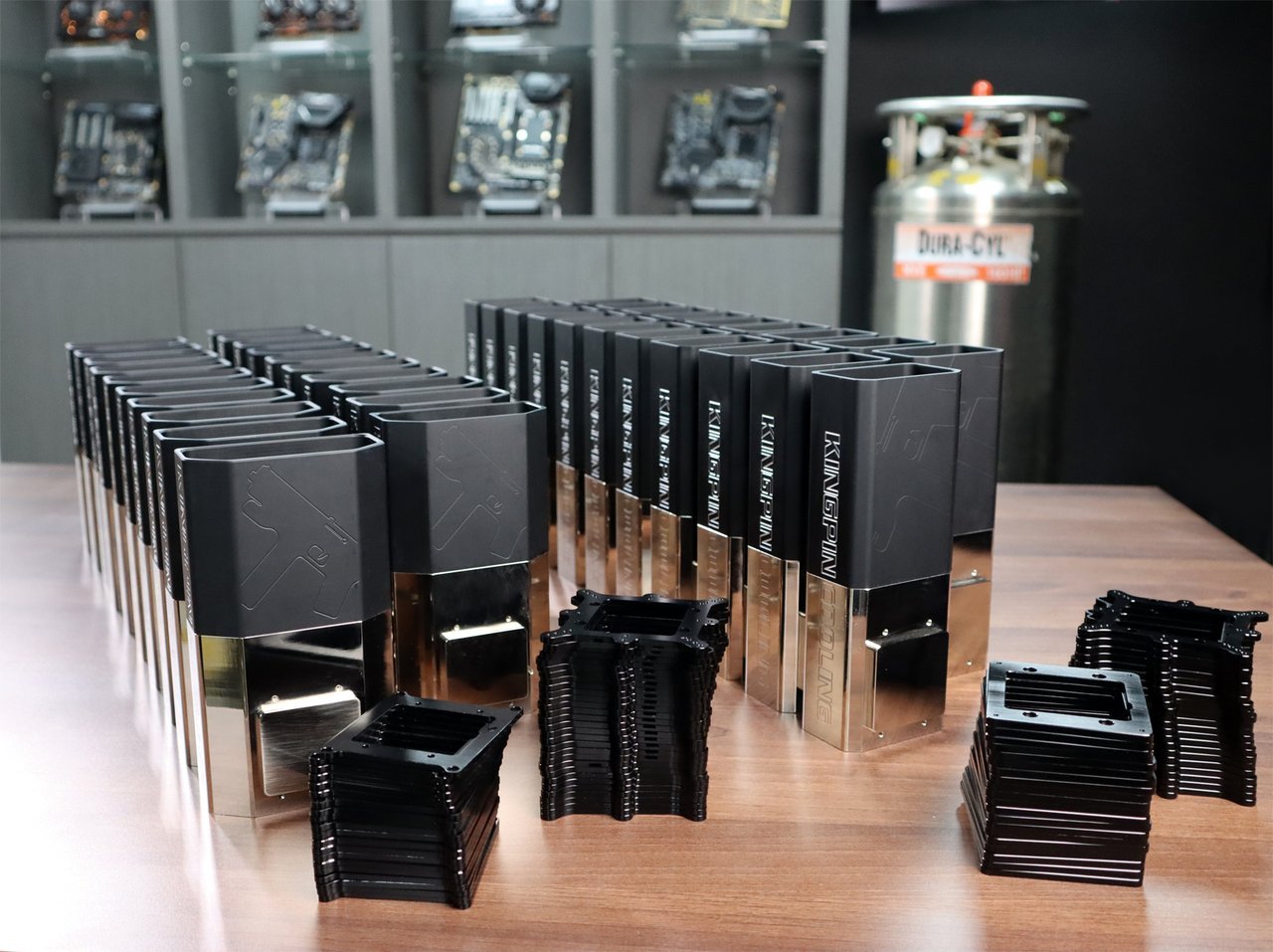Table of Contents
3090 Kingpin
Intro
EVGA RTX 3090 Kingpin Edition graphics card is based around new generation of ray trace-enabled NVIDIA Ampere A100 ASIC and Micron GDDR6X DRAM.
Clocks
With ampere its important to know that the clocks you see arent what you are getting. The best way i can describe it is there is Commanded clock and there is actual clock. Most of your tools and utilities will reflect commanded clock. There are 3 pieces of software at the time of writing this specific article that read actual clocks. Thermspy, Ampere OC Tool, 3DMark, and Nvidia Inspector are the ones that work. For simplicities sake id use thermspy or Ampere OC Tool as it reads both values. 3DMark only reads actual and Nvidia Inspector is not publicly avaiable.
Main article: Software
ProbeIt monitoring header
For voltage monitoring purposes this card has traditional EVGA ProbeIt, which is a 10-pin 2mm pitch PH-type connector near the top PCB edge. Pin definition as below:
| Number | Description |
|---|---|
| Pin 1 | GPU voltage / NVVDD |
| Pin 2 | Ground |
| Pin 3 | MEM voltage / FBVDD |
| Pin 4 | Ground |
| Pin 5 | PLL voltage / PEXV |
| Pin 6 | Ground |
| Row 7 | Onboard +1.8V power voltage |
| Row 8 | Ground |
| Row 9 | Onboard +12V PCIe power voltage |
| Row 10 | Ground |
ProbeIt pinout is same since the GTX 680 era, so you still can use your ProbeIt setup if you had it done before. The only difference is replacement of +3.3V probe point with +1.8V rail instead. This I/O voltage is used as main logic level on RTX series graphic cards now, providing power for BIOS, display outputs and various onboard auxiliary logic. Also same helpful label with voltage names is located on the bottom side of PCB near each ProbeIt connector pin to aid connection.
V-Tune onboard switches
vBIOS Switch
vBIOS
Preloaded vBios
Just like all previous KINGPIN Edition cards, 3090 KPE has three independent different BIOS ROMs and the corresponding switch to select between them. Default configuration with switch locked at right (towards power plugs), setting on NORMAL BIOS position. BIOS difference comparison between the three is presented in V-Tune On Board Switches.
| Normal BIOS switch | OC BIOS switch | LN2 BIOS switch | |
|---|---|---|---|
| GPU Clocks Boost/Memory clock | 1.92GHz / 19.5Gbps | Same as Normal | Same as Normal |
| BIOS Version | 94.02.42.00.0B | 94.02.42.00.10 | 94.02.42.00.0F |
| 360mm Hybrid Fan speed range | ? | ? | ? |
| VRM Fan speed range | ? | ? | ? |
| Fan stop at idle/low load | Yes | Yes | Yes |
| Power Limit | 100w-450w | 100W-480W | 100w-520w |
| TGP Range | -77%-105% | -77%-112% | -77%-121% |
| Protection function | Full Protection | Full Protection | No temperature protection |
LN2 BIOS switch position disable temperature protection by hardware. This is a crucial feature to enable for LN2-type cooling, but totally unnecessary(and even dangerous) for watercooling/aircooling use. Using LN2 BIOS position is not recommended for daily use, but available for benchmarking purposes.
If you want to enjoy maximum fan speeds that 90.02.30.00.79 version provide, you can flash it into “Normal” or “OC” position instead, to maintain thermal protection mechanisms and safety. Any of the three BIOSes can be flashed with unofficial KPE BIOS ROMs and operated independently.
BIOS can be flashed using Download:NVFlash from TechPowerUp. You need version 5.567.0 or newer.
Card is already shipped with three different BIOSes, available for download as backup dumps:
Download:Normal BIOS, Version 94.02.42.00.0B This BIOS is stock baseline
Download:OC BIOS, Version 94.02.42.00.10 This one is similar to Normal but with Higher TDP target limit
Download:LN2 BIOS, Version 94.02.42.00.0F This one is similar to OC but with Higher TDP target limit
Custom unofficial XOC BIOS
Current normal BIOS provided above (as shipped with card) with maxed out 144% power limit target already allow GPU to reach maximum everyday frequency without need of special VBIOS or risks involved flashing it.
However, if you want to do benchmarking with extreme cooling, you might want to get purpose built custom ROM from link below. Keep in mind, this BIOS is not for everyday use.
Download:XOC unofficial BIOS, Version 90.02.17.40.88 XOC overclocking version for RTX 3090 KINGPIN card.
This archive is password protected to ensure you have read this guide carefully and agree with the risks involved of flashing custom binary into your KINGPIN. Password from the archive is ipromisenottoRMAthiscard.
XOC BIOS have next limitations to restrict its use only for benchmarking purposes:
- All fans are 100% speed (“jet engine mode”).
- Fan speed curves or adjustment in PX1 is disabled.
- Temp target is removed.
- Power limit is not there anymore.
- Card ID is generic in this BIOS (meaning you need to use nvflash with -6 parameter to flash into this BIOS or restore original BIOS).
NOTE: BIOSes in this section are compatible only with EVGA RTX 3090 KINGPIN card. These BIOS are unofficial and provided AS IS, without any warranty for education purpose only. Do NOT hotlink this BIOS on forums or social media.
Precision X1
RTX 3090 KPE supported by Precision X1 since version 1.1.2.0.
IMGIMGIMG
KINGPIN RTX 3090 have special hardware to actually measure all the relevant voltages in real-time and report those measurements to Precision X1 which can read and display real measured voltages in software and on OLED. It works automatically with every 3090 KINGPIN graphics card and does not need any settings adjustment. Just make sure you use Precision X1 version 1.1.2.0 or newer.
Download: Version 1.1.4 Release: 12/15/2020
- Fixes crash on opening due to profile mismatch
- Fixes issue where the VF Curve does not save correctly
Download: Version 1.1.3 Release: 12/14/2020
- Update firmware for FTW3 / XC3 LED fine-tune support.
- Fix KINGPIN iCX sensors read error issue
- Remove KINGPIN animation upload
- Fix lost MCU after firmware update
- Fix GTX 10 series OC Scan VF curve data issue
- Textbox input for fan speed
Download: Version 1.1.2.0 Release: 11/26/2020
- Adds support for EVGA GeForce RTX 3090 K|NGP|N
- Various Bug Fixes
Firmware
Stock - 3.01.23
After PX1 1.1.3 - 3.01.26
Classified Tool
There is secret Classified tool available to play with various onboard KINGPIN RTX settings for maximum performance tweaking.
Uncheck “Auto” checkbox to unleash the beast. Keep an eye on temperatures! Power consumption and stress to GPU is increased exponentially from elevated voltage, instead of linear for clock frequency OC only.
NOTE: Do NOT set anything over 1200 mV for any type of near ambient cooling. Even with chilled watercooling and antifreeze your GPU temperatures under load will be positive and giving more juice to poor chip will only throttle it. It’s easy to see by lack of performance scaling (such as 3Dmark score / game fps).
When you use a tool, it’s a good idea not to mess with voltage control in Precision X1. Using multiple programs to control card settings can easily corrupt driver settings and create havoc. Great example of “Too many cooks in the kitchen”, because different applications do not communicate to each other, to gracefully apply settings.
This tool applies settings to hardware directly and settings will stay until the card is power cycled (complete shutdown). If you need reset to default settings – just power cycle the system, that will clear any classified settings. You do NOT need to keep tool open to maintain settings, they will stay set, until the card is power cycled.
NOTE: For LN2 benchmarking make sure to disable NVVDD OCP and enable LN2 VRM mode settings!
Download: Classified Tool
There is also a modified Version of this tool. The only difference is you can send l2C commands.
Download: Classified Tool Modified
Other Software
For the reasoning on why these are here please check out
Main article: Clocks
Ampere OC Tool
 Download: Ampere OC Tool
Download: Ampere OC Tool
Thermspy
 Download: Thermspy
Download: Thermspy
Water Block Options
There are no open loop water block options right now.
EVGA: Hydro Copper is planned but not set in stone if its going to be a separate item or if there is going to be a additional SKU with a preinstalled block. Regardless as of late December 2020 all Hydro Copper blocks were delayed due to QC issues in early production samples.

Optimus: Optimus PC has hinted that they are going to make Kingpin blocks but in their list of plans it is last and there is no ETA.

LN2 Extreme OC cooling compatibility
At this time there is only one LN2 pot available for ampere cards. That would be the Kingpin Cooling Tek-9 Icon V5.




